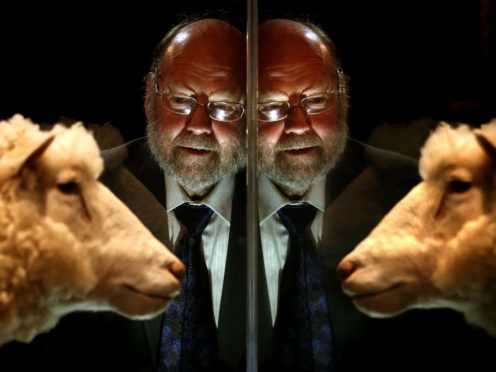A scientist who led the team that created Dolly the sheep has backed research to tackle Parkinson’s disease, after being diagnosed with the condition.
Professor Sir Ian Wilmut announced his diagnosis on World Parkinson’s Day ahead of the launch of a major research programme.
Experts at the Universities of Edinburgh and Dundee are to join forces to enable trial therapies which aim to slow down the progression of Parkinson’s disease.
The Dundee-Edinburgh Parkinson’s Research Initiative plans to investigate the causes of disease and translate scientific discoveries into new therapies.
Professor Wilmut, who retired from the University of Edinburgh in 2012, said: “Initiatives of this kind are very effective not only because they bring more people together, but because they will include people with different experience and expertise.
“It was from such a rich seedbed that Dolly developed and we can hope for similar benefits in this project.”
The ultimate goal, scientists say, is to find new approaches to predict and prevent the progressive condition caused by damage to specific cells in the brain.
They also hope to facilitate clinical testing of therapies aimed at slowing or reversing disease progression.
The condition affects movement and is often associated with involuntary shaking.
Therapies exist to reduce symptoms and help prolong quality of life, but there are currently no treatments to slow or halt the progression of the disease.
Scottish patients wanting to take part in clinical trials of treatments that could delay disease progression now need to travel to centres in England or Wales, or even abroad.
Millions around the world are living with Parkinson's right now. Join us this World Parkinson's Day and show the world what that really means. #UniteForParkinsons pic.twitter.com/sTfCzc5xSr
— Parkinson's UK (@ParkinsonsUK) April 11, 2018
Dolly the sheep was created at The Roslin Institute in 1996 by a multidisciplinary research team led by Professor Wilmut.
She was the first clone of an animal from an adult cell and her birth turned scientific thinking on its head.
The pioneering breakthrough paved the way for others to develop a method of using adult cells to produce reprogrammable cells that could develop into “induced pluripotent” stem cells, or iPSCs.
Edinburgh scientists were the first in the UK to produce iPSCs in the lab from patients with Parkinson’s disease.
The cells provide an invaluable resource for studying the mechanisms underlying the disease and testing potential drug treatments.
Dr Tilo Kunath, at Edinburgh’s Medical Research Council Centre for Regenerative Medicine, said: “People with Parkinson’s urgently require access to earlier and more accurate diagnosis, better prediction of how their disease will progress, and most importantly, the opportunity to participate in clinical trials of new treatments.
“This new research partnership aims to make these hopes a reality for people in Scotland.”
There are 12,00 people in Scotland with the condition. In the UK, the number is expect to double in the next 50 years as the population grows and people live longer.
Professor Dario Alessi, of the University of Dundee, added: “I feel optimistic and it is not unrealistic that with a coordinated research effort, major strides towards better treating Parkinson’s disease can be made.”
